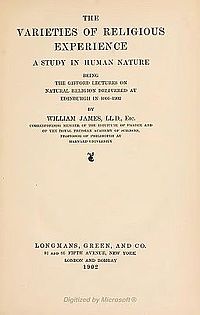The Varieties of Religious Experience
 |
|
| Author | William James |
|---|---|
| Original title | The Varieties of Religious Experience: A Study in Human Nature, Being the Gifford Lectures on Natural Religion Delivered at Edinburgh in 1901–1902 |
| Country | United States |
| Language | English |
| Subject | Philosophy of religion |
| Publisher | Longmans, Green & Co. |
|
Publication date
|
1902 |
| Media type | |
| Pages | 534 |
| LC Class | BR110.J3 1902a |
| Followed by | Pragmatism: A New Name for Some Old Ways of Thinking (1907) |
The Varieties of Religious Experience: A Study in Human Nature is a book by Harvard University psychologist and philosopher William James. It comprises his edited Gifford Lectures on natural theology, which were delivered at the University of Edinburgh in Scotland in 1901 and 1902. The lectures concerned the nature of religion and the neglect of science in the academic study of religion.
Soon after its publication, Varieties entered the Western canon of psychology and philosophy and has remained in print for over a century.
James later developed his philosophy of pragmatism. There are many overlapping ideas in Varieties and his 1907 book, Pragmatism.
James was most interested in direct religious experiences. Theology and the organizational aspects of religion were of secondary interest. He believed that religious experiences were simply human experiences ("Religious happiness is happiness. Religious trance is trance.").
He believed that religious experiences can have "morbid origins" in brain pathology and can be irrational but nevertheless are largely positive. Unlike the bad ideas that people have under the influence of a high fever, after a religious experience the ideas and insights usually remain and are often valued for the rest of the person's life.
Under James’ pragmatism, the effectiveness of religious experiences proves their truth, whether they stem from religious practices or from drugs ("Nitrous oxide ... stimulate[s] the mystical consciousness in an extraordinary degree.").
James had relatively little interest in the legitimacy or illegitimacy of religious experiences. Further, despite James' examples being almost exclusively drawn from Christianity, he did not mean to limit his ideas to any single religion. Religious experiences are something that people sometimes have under certain conditions. In James' description, these conditions are likely to be psychological or pharmaceutical rather than cultural.
James believed that the origins of a religion shed little light upon its value. There is a distinction between an existential judgment (a judgment on "constitution, origin, and history") and a proposition of value (a judgment on "importance, meaning, or significance").
...
Wikipedia
